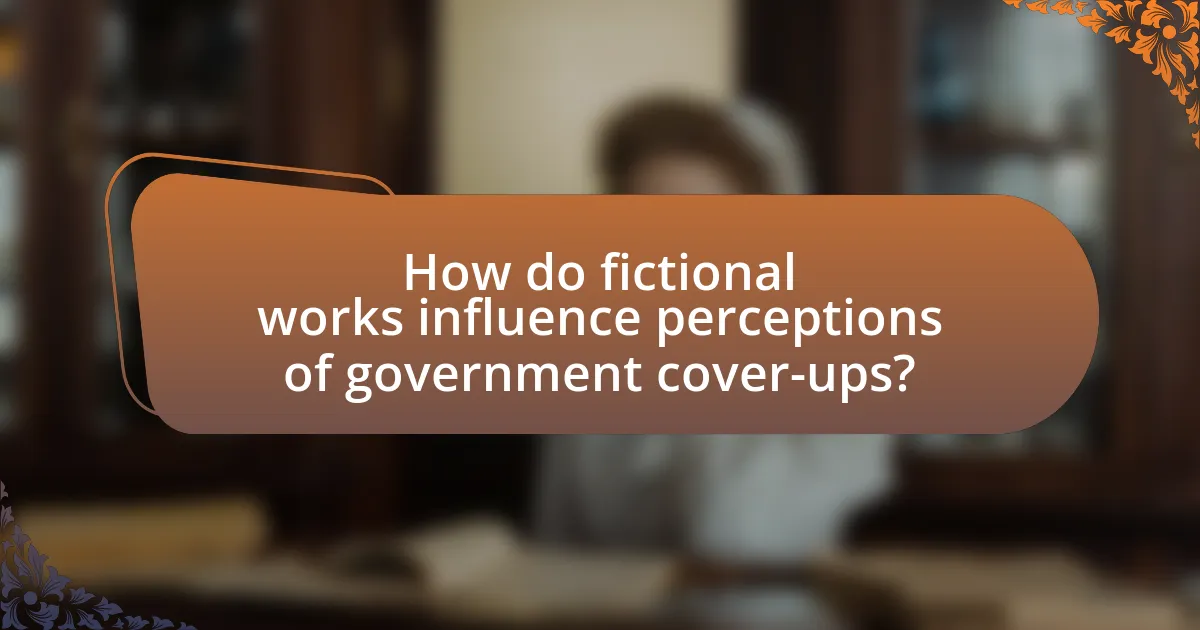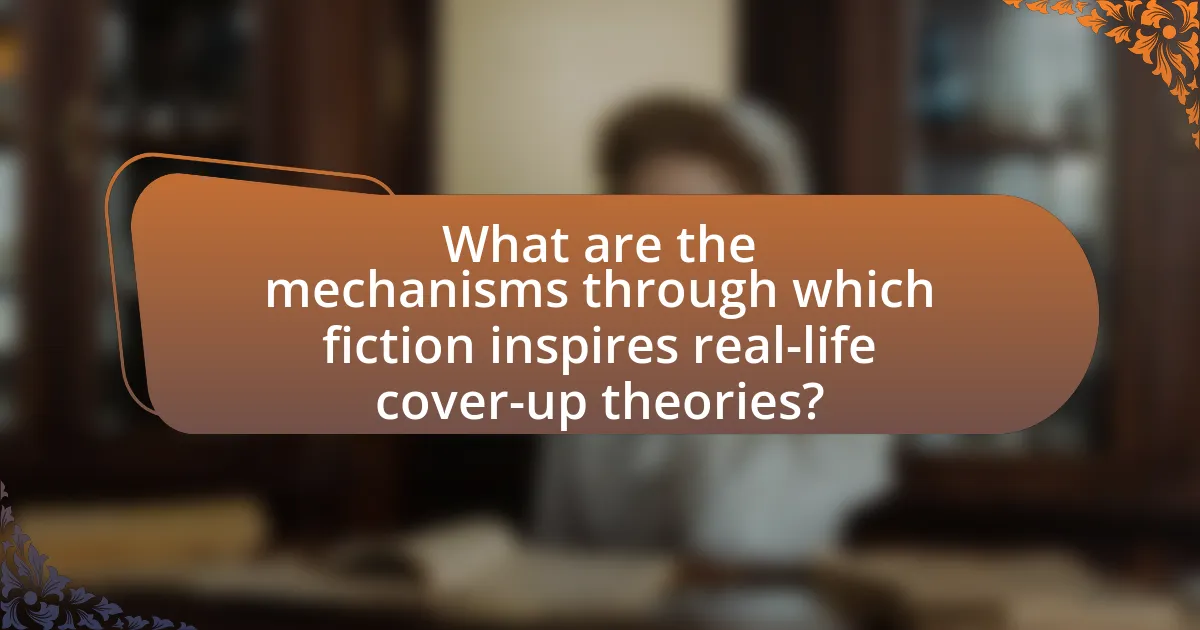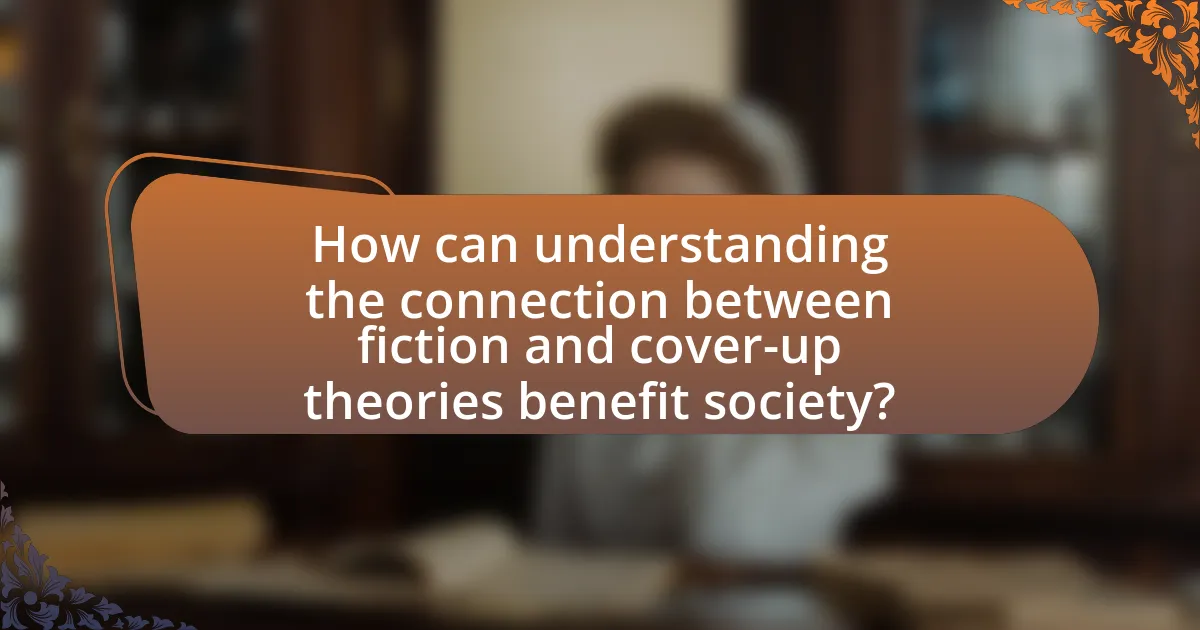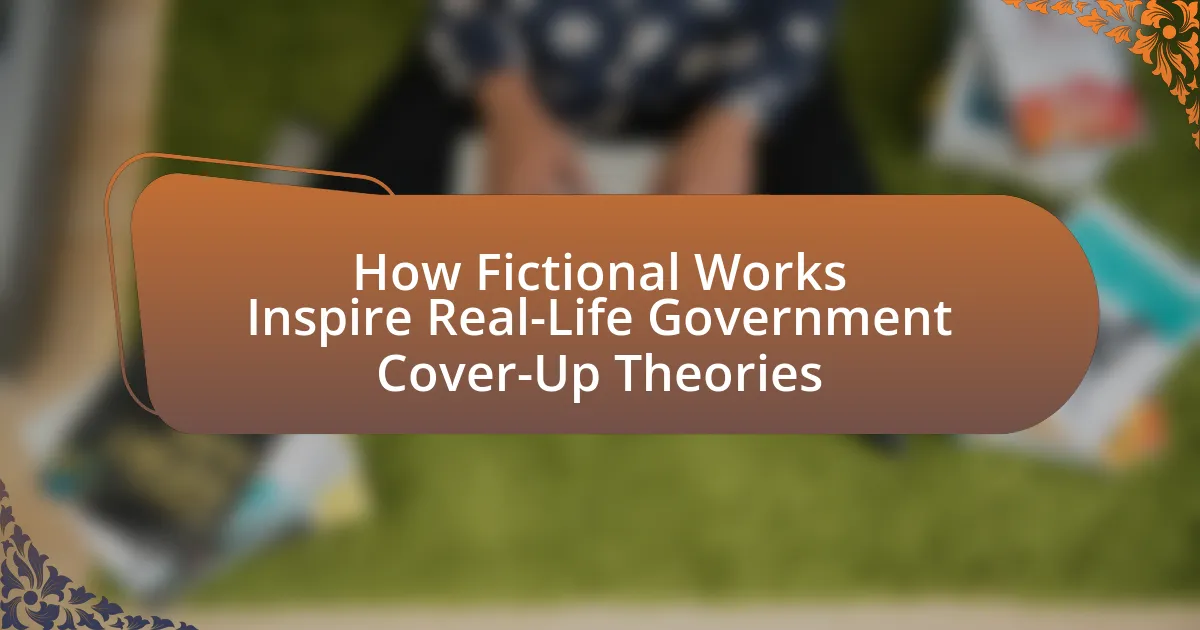The article examines how fictional works influence public perceptions of government cover-ups, highlighting the role of narratives in fostering skepticism and distrust towards authority. It discusses notable examples such as “The X-Files,” “The Manchurian Candidate,” and “V for Vendetta,” which reflect societal fears about governmental transparency. The article also explores the psychological factors that contribute to the appeal of conspiracy theories in fiction, the impact of these narratives on public opinion, and the mechanisms through which fiction inspires real-life beliefs about government secrecy. Additionally, it emphasizes the importance of critical thinking and media literacy in discerning fact from fiction regarding government actions.

How do fictional works influence perceptions of government cover-ups?
Fictional works significantly influence perceptions of government cover-ups by shaping narratives that resonate with public skepticism and distrust. These narratives often depict governments as secretive entities engaged in conspiracies, which can lead audiences to question the authenticity of real-life events. For instance, films like “The X-Files” and novels such as “The Da Vinci Code” popularize themes of hidden truths and manipulation, reinforcing the idea that official accounts may be misleading. Research indicates that exposure to such fictional portrayals can increase belief in conspiracy theories, as evidenced by a study published in the journal “Psychological Science,” which found that individuals who consume conspiracy-themed media are more likely to endorse conspiracy beliefs in real life. This interplay between fiction and perception highlights how storytelling can mold societal views on governmental transparency and accountability.
What are some notable examples of fictional works that depict government cover-ups?
Notable examples of fictional works that depict government cover-ups include “The X-Files,” “The Manchurian Candidate,” and “V for Vendetta.” “The X-Files” explores various conspiracy theories involving government secrecy and extraterrestrial life, highlighting the tension between truth and deception. “The Manchurian Candidate” presents a narrative about brainwashing and political manipulation, showcasing a covert operation that influences a soldier’s actions. “V for Vendetta” critiques government oppression and the lengths to which authorities will go to maintain control, illustrating a dystopian society where the truth is suppressed. These works reflect societal fears and suspicions about governmental transparency and accountability.
How do these examples reflect real-world events?
These examples reflect real-world events by illustrating how fictional narratives can shape public perception and belief in government cover-ups. For instance, works like “The X-Files” and “Wag the Dog” have influenced audiences to question the transparency of government actions, particularly in times of crisis. The portrayal of conspiracies in these narratives often mirrors actual historical events, such as the Watergate scandal, where government deception was revealed, leading to widespread distrust. This connection between fiction and reality demonstrates how storytelling can impact societal views on accountability and transparency in governance.
What themes are commonly explored in these fictional narratives?
Common themes explored in fictional narratives about government cover-up theories include conspiracy, secrecy, and the struggle for truth. These narratives often depict characters uncovering hidden agendas, revealing the tension between authority and individual rights. For instance, works like “The X-Files” and “1984” illustrate how government entities manipulate information to maintain control, highlighting societal distrust in institutions. Such themes resonate with audiences, reflecting real-world concerns about transparency and accountability in governance.
Why do audiences resonate with cover-up theories in fiction?
Audiences resonate with cover-up theories in fiction because these narratives tap into deep-seated fears and suspicions about authority and transparency. Fictional cover-up stories often reflect real-world concerns regarding government secrecy and manipulation, making them relatable and engaging. For instance, works like “The X-Files” and “The Parallax View” explore themes of conspiracy and hidden truths, which resonate with viewers who may feel distrustful of institutions. This connection is reinforced by psychological studies indicating that people are drawn to narratives that challenge their perceptions of reality, as they provide a sense of agency and understanding in a complex world.
What psychological factors contribute to this fascination?
The psychological factors contributing to the fascination with government cover-up theories inspired by fictional works include cognitive biases, the need for control, and the allure of mystery. Cognitive biases, such as confirmation bias, lead individuals to seek information that supports their pre-existing beliefs, making them more receptive to conspiracy theories. The need for control arises from uncertainty in complex societal issues, prompting individuals to find explanations that provide a sense of understanding and predictability. Additionally, the allure of mystery captivates the human mind, as narratives filled with intrigue and hidden truths stimulate curiosity and engagement. These factors collectively enhance the appeal of fictional portrayals of government cover-ups, making them resonate with audiences on a psychological level.
How does the portrayal of government in fiction shape public opinion?
The portrayal of government in fiction significantly shapes public opinion by influencing perceptions of authority, trust, and accountability. Fictional narratives often depict governments as either benevolent or malevolent, which can lead audiences to adopt similar views in real life. For instance, works like George Orwell’s “1984” and the television series “The X-Files” have contributed to a widespread skepticism towards government transparency and intentions, reflecting and reinforcing public fears about surveillance and conspiracy. Studies have shown that exposure to such narratives can alter individuals’ beliefs about government efficacy and integrity, as evidenced by research from the University of Southern California, which found that fictional representations can lead to increased distrust in real-world institutions.

What are the mechanisms through which fiction inspires real-life cover-up theories?
Fiction inspires real-life cover-up theories primarily through narrative techniques that create compelling plots, emotional engagement, and the suspension of disbelief. These narratives often present scenarios involving government secrecy, manipulation, or conspiracies, which resonate with audiences’ existing suspicions about authority. For instance, works like George Orwell’s “1984” and films such as “The X-Files” depict dystopian realities where governments conceal truths, leading audiences to draw parallels with real-world events, such as the Watergate scandal or the Iran-Contra affair. This connection is reinforced by the psychological phenomenon known as “confirmation bias,” where individuals seek information that supports their pre-existing beliefs, making them more likely to accept fictional narratives as plausible explanations for real-life occurrences.
How do fictional narratives create a framework for conspiracy thinking?
Fictional narratives create a framework for conspiracy thinking by presenting complex plots that often involve hidden motives, secret organizations, and unexplained events. These narratives engage audiences by blurring the lines between reality and fiction, leading individuals to draw parallels between the storylines and real-world events. For instance, works like “The X-Files” and “JFK” have popularized the idea of government cover-ups, influencing public perception and skepticism towards official narratives. Research indicates that exposure to such narratives can increase belief in conspiracy theories, as they provide a cognitive template that makes individuals more likely to interpret ambiguous information as evidence of conspiracies.
What role does storytelling play in shaping beliefs about government actions?
Storytelling significantly influences beliefs about government actions by framing narratives that shape public perception and understanding. Through compelling narratives, storytelling can evoke emotions, create relatable characters, and present complex issues in simplified forms, making it easier for individuals to form opinions about government behavior. For instance, fictional works like George Orwell’s “1984” and Aldous Huxley’s “Brave New World” have historically shaped public discourse around government surveillance and control, leading to heightened skepticism and concern regarding real-life government practices. These narratives resonate with audiences, often leading them to question the integrity and motives of governmental institutions, thereby reinforcing or challenging existing beliefs about their actions.
How do plot devices in fiction mirror real-life governmental secrecy?
Plot devices in fiction often mirror real-life governmental secrecy by employing themes of hidden truths, conspiracies, and the manipulation of information. For instance, narratives like George Orwell’s “1984” illustrate the extent of state control over information, reflecting real-world practices such as censorship and surveillance seen in authoritarian regimes. Additionally, films like “The Bourne Identity” depict government agencies engaging in covert operations, paralleling documented instances of espionage and classified missions, such as those revealed in the Church Committee hearings in the 1970s. These fictional portrayals resonate with audiences by highlighting the tension between public perception and concealed realities, thereby reinforcing skepticism towards governmental transparency.
What impact do fictional works have on the public’s trust in government?
Fictional works significantly impact the public’s trust in government by shaping perceptions and beliefs about governmental integrity and transparency. For instance, narratives in films and literature often depict governments as corrupt or secretive, which can lead to skepticism among audiences. Research indicates that exposure to such fictional portrayals can reinforce existing distrust; a study published in the Journal of Communication found that individuals who consume media depicting government conspiracies are more likely to believe in real-life government cover-ups. This suggests that fictional narratives not only reflect societal anxieties but also actively contribute to the erosion of trust in governmental institutions.
How do these narratives contribute to skepticism towards official narratives?
Fictional narratives contribute to skepticism towards official narratives by presenting alternative viewpoints that challenge the credibility of government statements. These stories often depict scenarios where authorities manipulate information or conceal truths, leading audiences to question the reliability of real-life communications from those in power. For instance, works like George Orwell’s “1984” and films such as “The Parallax View” illustrate themes of surveillance and deception, which resonate with historical instances of government misinformation, such as the Watergate scandal. This connection between fiction and reality fosters a mindset where individuals are more likely to doubt official accounts, as they draw parallels between fictional portrayals and actual events.
What are the consequences of this skepticism in society?
Skepticism in society leads to a distrust of institutions and authorities, which can undermine social cohesion and hinder effective governance. This distrust often results in increased conspiracy theories, as individuals question official narratives and seek alternative explanations for events. For instance, studies have shown that belief in conspiracy theories can correlate with lower civic engagement and reduced participation in democratic processes, as individuals may feel disillusioned or alienated from the political system. Furthermore, skepticism can impede public health initiatives, as seen during the COVID-19 pandemic, where skepticism about government messaging contributed to vaccine hesitancy and lower vaccination rates.

How can understanding the connection between fiction and cover-up theories benefit society?
Understanding the connection between fiction and cover-up theories can benefit society by enhancing critical thinking and media literacy. When individuals recognize how fictional narratives can shape perceptions of reality, they become more adept at questioning the authenticity of information presented to them. For instance, the portrayal of government conspiracies in films and literature often mirrors real-life events, such as the Watergate scandal, which revealed the extent of governmental deception. This awareness encourages citizens to scrutinize official narratives and seek evidence-based information, ultimately fostering a more informed and engaged populace.
What lessons can be learned from analyzing fictional portrayals of government secrecy?
Analyzing fictional portrayals of government secrecy reveals critical lessons about public perception and trust in authority. These narratives often highlight the potential for abuse of power, as seen in works like George Orwell’s “1984,” which illustrates how totalitarian regimes manipulate information to control citizens. Such portrayals can lead to increased skepticism among the public regarding governmental transparency and accountability. Furthermore, fictional accounts often serve as cautionary tales, emphasizing the importance of vigilance and critical thinking in the face of official narratives. This is supported by studies indicating that media representations can shape societal attitudes towards real-world issues, reinforcing the idea that fiction can influence public discourse on government practices.
How can these insights inform public discourse on transparency and accountability?
Insights from fictional works that depict government cover-ups can significantly inform public discourse on transparency and accountability by highlighting the potential consequences of secrecy and misinformation. These narratives often illustrate the erosion of public trust when governments fail to disclose information, as seen in historical events like the Watergate scandal, which revealed the dangers of unchecked power and lack of transparency. By analyzing these fictional portrayals, citizens can better understand the importance of demanding accountability from their leaders and the need for robust mechanisms to ensure transparency in governance. This understanding can lead to increased civic engagement and advocacy for policies that promote open communication and ethical conduct in government.
What strategies can be employed to critically evaluate fictional narratives?
To critically evaluate fictional narratives, one effective strategy is to analyze the underlying themes and motifs that reflect societal issues, such as government cover-ups. This involves examining character motivations, plot structures, and the context in which the narrative was created. For instance, narratives like George Orwell’s “1984” and Aldous Huxley’s “Brave New World” serve as critiques of totalitarianism and societal control, illustrating how fiction can mirror real-world concerns about government transparency. By comparing these fictional elements to historical events or current affairs, one can assess the narrative’s relevance and impact on public perception. This method not only enhances understanding of the narrative itself but also reveals its potential influence on real-life beliefs and theories regarding government actions.
What practical steps can individuals take to discern fact from fiction regarding government cover-ups?
Individuals can discern fact from fiction regarding government cover-ups by critically evaluating sources, cross-referencing information, and seeking expert opinions. Critical evaluation involves assessing the credibility of the source, such as checking the author’s qualifications and the publication’s reputation. Cross-referencing entails comparing multiple sources to identify consistent information, which can help validate claims. Seeking expert opinions, such as those from historians or investigative journalists, provides informed perspectives that can clarify complex issues. For instance, the 1975 Church Committee report revealed extensive government surveillance programs, demonstrating the importance of thorough investigation and credible sources in uncovering truths about government actions.
How can critical thinking skills be applied to media consumption?
Critical thinking skills can be applied to media consumption by enabling individuals to analyze, evaluate, and interpret information critically. This involves questioning the credibility of sources, assessing the validity of arguments presented, and recognizing biases in media content. For instance, a study by the Pew Research Center found that 64% of Americans believe that misinformation is a major problem in the news, highlighting the necessity for critical evaluation of media sources. By applying critical thinking, consumers can discern fact from fiction, particularly in narratives that may be influenced by fictional works, thereby reducing susceptibility to government cover-up theories that often arise from sensationalized media portrayals.
What resources are available for further exploration of this topic?
Resources available for further exploration of how fictional works inspire real-life government cover-up theories include academic journals, books, and documentaries. For instance, the book “Conspiracy Theories: Secrecy and Power in American Culture” by Mark Fenster provides an in-depth analysis of the relationship between fiction and conspiracy theories. Additionally, the journal “Critical Inquiry” often publishes articles examining the intersection of literature and political discourse, which can provide valuable insights. Documentaries such as “The Men Who Stare at Goats” explore the blurred lines between fiction and reality in government operations, further illustrating the topic. These resources collectively offer a comprehensive foundation for understanding the influence of fictional narratives on public perception of government secrecy.
